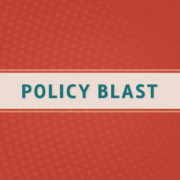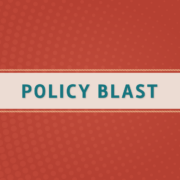Senate Interior Appropriations Bill Passes out of Committee with Advance Appropriations and a Modest Increase for the Indian Health Service
The bill includes $7.27 billion for IHS, $2.6 billion less than the amount requested by the President.
On July 27, 2023, the Senate Appropriations Committee completed the markup of the Fiscal Year (FY) 24 Interior, Environment, and Related Agencies bill. The bill passed out of committee with a vote of 28-0 and will advance to the Senate floor for initial passage. The bill authorizes $7.27 billion for IHS— an increase of $218.6 million from FY23 but $2.68 billion below the President’s request. The FY24 budget also includes $92.4 million for Urban Indian health, which is $2 million above the FY23 enacted levels but $22.7 million under the House recommended amount and President Biden’s Request. Advance appropriations for IHS was maintained for FY25 and received an increase to $5.22 billion from $5.12 billion for FY24. Other key provisions include: $8 million to improve maternal health and $2.5 million for the Produce Prescription Pilot Program for Tribes and urban Indian organizations (UIOs) to increase access to produce and other traditional foods. A more detailed analysis follows below.
- FY24 Senate Interior Bill Report with Urban Indian Health Line Item
- FY24 Senate Interior Bill Text
- FY24 Senate Interior Bill Summary
During the Full Appropriations Committee hearing, Chair of the Committee, Senator Patty Murray (D-WA) expressed the importance of protecting the Indian Health Service, “This bill plays a critical role in making sure we keep our promises to Tribes and deliver on key federal investments by sustaining funding for the Indian Health Service and providing new resources to support Tribal families, protect Tribal treaty rights, and more.”
Line Item |
FY23 Enacted | FY24 TBFWG Request | FY24 President’s Budget |
FY24 House Proposed | FY24 Senate Proposed |
| Urban Indian Health | $90,419,000 | $973,590,000 | $115,150,000 | $115,150,000 | $92,419,000 |
| Indian Health Service | $6,958,223,000 | $50,996,276,000 | $9,700,000,000 | $7,078,223,000 | $7,275,531,000 |
| Advance Appropriations | $5,129,458,00 | Request is to expand advance appropriations to include all IHS accounts | $5,129,458,00 | $5,878,223,000 | $5,228,112,000 |
Establishment of a UIO Interagency Workgroup
The bill also includes direction for IHS to establish a UIO Interagency Workgroup. The bill report reads, “Despite the excellent efforts of Urban Indian Organizations, AI/AN populations continue to be left out of many Federal initiatives. Therefore, the Committee directs the Indian Health Service to continue to explore the formation of an interagency working group to identify existing Federal funding supporting Urban Indian Organizations [UIOs] and determine where increases are needed, where funding is lacking, or what programs should be amended to allow for greater access by UIOs; to develop a Federal funding strategy to build out and coordinate the infrastructure necessary to pilot and scale innovative programs that address the needs and aspirations of urban AI/ANs in a holistic manner; develop a wellness centered framework to inform health services; and meet quarterly with UIOs to address other relevant issues. In addition to the Indian Health Service, the working group should consist of the U.S. Department of Health and Human Services, U.S. Department of Housing and Urban Development, U.S. Department of Agriculture, U.S. Department of Justice, U.S. Department of Education, U.S. Department of Veteran Affairs, U.S. Department of Labor, the Small Business Administration, the Economic Development Agency, FEMA, the U.S. Conference of Mayors, and others as identified by UIOs.”
The National Council of Urban Indian Health (NCUIH) has advocated for the creation of the UIO Interagency Workgroup as a key step to increasing support and resources to American Indians and Alaska Natives (AI/ANs) living in urban areas. On September 12, 2022, NCUIH submitted comments and recommendations to IHS regarding the formation of an Urban Interagency Workgroup with other federal agencies. The agency held an Urban Confer on July 13, 2022, in response to a letter sent to President Biden and Vice President Harris from several Senators, requesting the formation of such a workgroup. NCUIH will continue to work with House and Senate appropriators to ensure this language is included in the final appropriations bill.
Background and Advocacy
On March 9, 2023, President Biden released his budget request for FY24 which included $9.7 billion for IHS and proposed mandatory funding for IHS from FY 2025 to FY 2033 to the amount of $288 billion over-ten years as well as exempting IHS from sequestration. This mandatory formula would culminate in $44 billion for IHS in FY 2033, to account for inflation, staffing increases, long-COVID treatment, and construction costs. This move from discretionary to mandatory funding is essential as noted in the IHS Congressional Justification, “While the progress achieved through the enactment of advance appropriations will have a lasting impact on Indian Country, funding growth beyond what can be accomplished through discretionary spending is needed to fulfill the federal government’s commitments to Indian Country.” On March 17, 2023, IHS published their Fiscal Year (FY) 2024 Congressional Justification with the full details of the President’s Budget, which includes $115 million for urban Indian health – a 27% increase above the FY 2023 enacted amount of $90.42 million.
On July 18, 2023, the House of Representatives Appropriations Committee advanced the FY24 Interior Appropriations bill with $7.079 billion for IHS, an increase in FY25 advance appropriations for IHS to $5.8 billion, and $115.15 million for urban Indian health.
- President’s FY 2024 Budget
- IHS FY 2024 Congressional Justification
- NCUIH Analysis of President’s FY 2024 Budget
- NCUIH Analysis of FY24 House Interior Appropriations Bill
- FY24 House Interior Bill Report with Urban Indian Health Line Item
- FY24 House Interior Bill Summary
- NCUIH Analysis of FY24 House Interior Bill
Full Funding, Maintain Advance Appropriations, and Mandatory Funding as Priorities
NCUIH requested full funding for urban Indian health for FY 2024 at $973.59 million for urban Indian Health in FY24 in accordance with the Tribal Budget Formulation Workgroup (TBFWG) recommendations. NCUIH also requested that advance appropriations be maintained for the Indian Health Service (IHS) until mandatory funding is achieved. The marked increase for FY24 is a result of Tribal leaders, over several decades, providing budget recommendations to phase in funding increases over 10-12 years to address growing health disparities that have largely been ignored.
On April 4, 2023, a group of 12 Senators sent a letter to the Senate Interior Appropriations Committee. The letter has bipartisan support and calls for support for Urban Indian Health based on the TBFWG’s recommendation and to maintain advance appropriations for IHS until such time that authorizers move IHS to mandatory spending. Representatives Gallego and Grijalva also led a Congressional letter to the House Committee on Appropriations for FY 2024 with the same requests.
On March 9, 2023, NCUIH CEO Francys Crevier (Algonquin), testified before and submitted public witness written testimony to the House Appropriations Subcommittee on Interior, Environment, and Related Agencies regarding FY 2024 funding. NCUIH requested full funding for IHS at $51.41 billion and Urban Indian Health for FY 2024 as requested by the TBFWG, maintain advance appropriations for IHS, and support of mandatory funding for IHS.
Bill Highlights
Indian Health Service: $7.27 billion
- Bill Report, Pg. 119, “The Committee recommendation provides $7,275,531,000 for IHS for fiscal year 2024 discretionary funding, an increase of $248,042,000 to the enacted level and a decrease of $2,194,123,000 to the requested level.”
Urban Indian Health: $92.4 million
- Bill Report, pg. 123, “The recommendation includes $92,419,000 for the Urban Indian Health program, $2,000,000 above the enacted level.”
Contract Support Costs $1 billion and Tribal 105(l) leases $149 million
- Bill Report, pg. 124, “The Committee has continued language from fiscal year 2021 establishing an indefinite appropriation for contract support costs estimated to be $1,051,000,000 in fiscal year 2024.
- Bill Report, pg. 124, “The recommendation includes an indefinite appropriation of an estimated $149,000,000 for the compensation of operating costs associated with facilities leased or owned by Tribes and Tribal organizations for carrying out health programs under ISDEAA contracts and compacts as required by 25 U.S.C. 5324(l).”
- The Biden Administration included Contract Support Costs and Tribal 105(l) leases as mandatory costs. The Committee did not recommend the line items to be mandatory costs.
- NCUIH along with 22 other Tribes and Native organizations advocated for these tribal sovereignty payments as mandatory in a letter to Congressional appropriators.
Dental Health: $254.7 million
- Bill Report pg. 122, “The recommendation includes $254,729,000 for dental health, an increase of $6,631,000 above the enacted level. The Service is encouraged to coordinate with the Bureau of Indian Education [BIE] to integrate preventive dental care at schools within the BIE system.”
Equipment: $32.59 million
- Bill Report, pg. 125, “The recommendation includes $32,598,000 for medical equipment upgrades and replacement, equal to the enacted level.”
Electronic Health Records: $217.6 million
- Bill Report, pg. 88, “The Committee is aware there is a need for a new electronic health record system to improve the overall interoperability, efficiency, and security of the Service’s information technology system and provides $217,564,000 for this effort, equal to the enacted level”
Mental Health: $130.2 million
- Bill Report, pg. 122, “The recommendation includes $130,155,000 for mental health programs, an increase of $2,984,000 above the enacted level.”
Alcohol and Substance Abuse: $266.8 million
- Bill Report, pg. 122, “The recommendation includes $266,843,000 for alcohol and substance abuse programs, an increase of $403,000 above the enacted level. The bill also provides $11,000,000 for opioid abuse, described below.”
Produce Prescription Pilot Program: $2.5 million
- Bill Report, pg. 120, “The bill maintains funding at fiscal year 2023 enacted levels for the Alzheimer’s program and Produce Prescription Pilot program.”
Maternal Health: $8 million
- Bill Report, pg. 120, “The Committee recommendation supports funding for maternal health initiatives and provides an additional $1,000,000 for these efforts as noted above.”
Alzheimer’s Disease: $5.5 million
- Bill Report pg. 120, “The bill maintains funding at fiscal year 2023 enacted levels for the Alzheimer’s program and Produce Prescription Pilot program.”
Purchased and Referred Care: $997.8 million
- Bill Report pg. 123, “—The recommendation includes $997,755,000 for purchased/referred care, an increase of $1,000,000 above the enacted level.”








Leave a Reply
Want to join the discussion?Feel free to contribute!